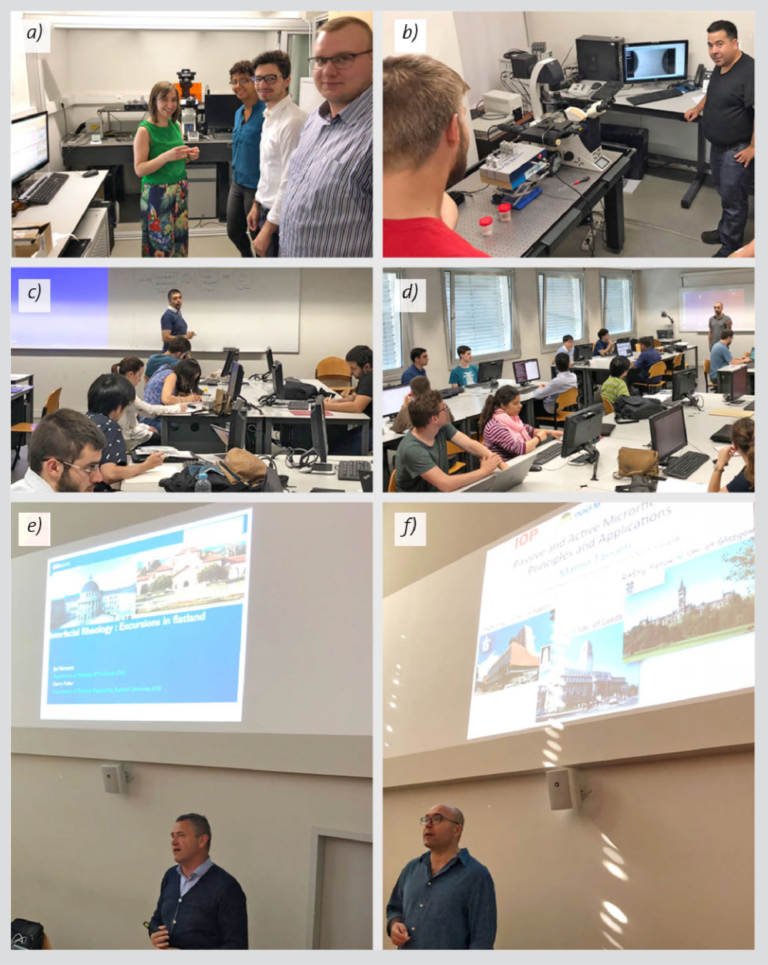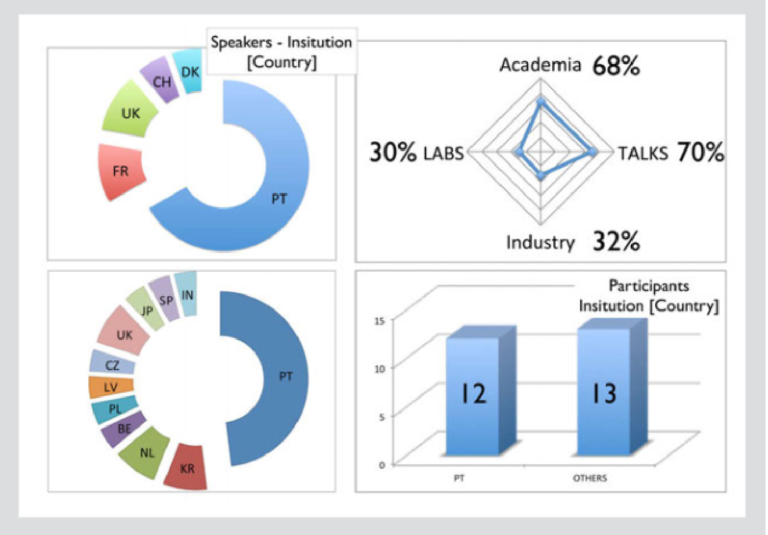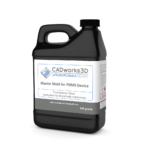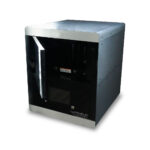2nd Summer School on Complex Fluid-Flows in Microfluidics
Francisco J. Galindo-Rosales
The second edition of the “Summer School on ComplexFluid-Flows in Microfluidics” was held at the Faculty ofEngineering of the University of Porto, Portugal fromJuly 9– 13, 2018 sponsored by Anton Paar, Applied Sci-ences, BlackHole Lab, Elveflow, Formulaction, the Por-tuguese Society of Rheology, and Rheinforce (in alpha-betical order). The company Creative CADWorks kindlyprovided microfluidic connectors, chips and molds fab-ricated with its 3Dprinter. This 5-days course (6h/day)intended to provide cutting-edge knowledge on com-plex fluid-flow at microscale to those researchers work-ing on microfluidics, with complex fluids or a combina-tion of both.The first day of the summer school was fully dedicatedto “Complex fluids and Rheometry at Microscale”.Three of the four different approaches to performrheometry of a fluid sample with a characteristic di-mension smaller than 1 mm were covered during thefirst day of the summer school: Manlio Tassieri (Univer-sity of Glasgow, UK) presented the different principlesand applications of passive and active microrheology,Jan Vermant (ETH Zürich, Switzerland) shared his ex-pertise on interfacial rhe o logy, Hubert Ranchon (For-mulaction, France) showed how to perform rheometryon a chip with their Fluidicam Rheo, and finally Francis-co J. Galindo-Rosales (CEFT/FEUP, Portugal) divided histime into two presentations, one focused on the differ-ent approaches for performing extensional rheometryon a chip, and another one focused on how to exploitthe non-linear behavior of complex fluids at microscalefor developing damping composites with optimal per-formance under impact loads.The second day was focused on “Fabrication tech-niques in Microfluidics”. Benjamin Sévénié (BlackHoleLab, France) showed how to fabricate microfluidic chipswithout a clean room, Vânia Silverio (INESC Microsys-tems and nanotechnologies, Portugal) talked aboutfabrication methods for precision microfluidic inter-faces for the development of microchannel integrateddevices, Paulo Freitas (International Iberian Nanotech-nology Laboratory, Portugal) lectured on magneto -phoretic and size based modules for biosensor applica-tions in microfluidics, and finally Paulo Marques (INESCTEC, Portugal) explained how to fabricate OptofluidicDevices by Femtosecond Laser Direct Writing and Ma-chining.

Figure 1: Pictures at different moments of the course: a) P.C. Sousa and b) J.M. Miranda during their parallel lab-sessions onfluid-flow characterization in microfluidics, c) J.D. Araújo and d) C.B. Fernandes during their lab-sessions on numerical opti-mization and computational simulation using OpenFOAM, e) J. Vermant and f) M. Tassieri at the beginning of their lectures.
The third day was centered on how to perform “Flu-id-flow characterization in Microfluidics”. During themorning, Benjamin Sévénié (in representation of Elve-Flow, France) talked about dispensing with pressurepump and measuring with flow sensor, and Mónica S.N.Oliveira (Strathclyde University, UK) lectured about different experimental techniques for performing a Fluidflow characterization at the microscale. The afternoonwas dedicated to an experimental lab-session, whereJoão M. Miranda (CEFT/FEUP, Portugal) demonstratedhow to generate and characterize microfluidic drop gen-eration, Patrícia C. Sousa (International Iberian Nano -technology Laboratory, Portugal) showed how to mea-sure velocity profiles with micro-PIV, and Francisco J.Galindo-Rosales (CEFT/FEUP, Portugal) showed differ-ent components typically used in microfluidic experi-ments, such as pressure/syringe pumps, pressure sen-sors, tubing and connectors, etc.
On the fourth day Alexandre M. Afonso (CEFT/FEUP,Portugal) and João M. Nóbrega (IPC/University of Min-ho, Portugal) lectured during the morning session on“Computational modelling of complex fluid-flows atmicroscales”. The afternoon was fully dedicated to acomputational Lab-Session, coordinated by Célio B. Fer-nandes (IPC/University of Minho, Portugal) and Luís L.Ferrás (IPC/I3N/University of Minho, Portugal), sup-ported by J.M. Nóbrega and A.M. Afonso, respectively.
The last day was entirely dedicated to “Numericaloptimization in Microfluidics”. The morning session wasdedicated to the lectures of Kristian E. Jensen (Comsol,Denmark), who talked about the basics concept and op-timization with Finite Element Methods, and Manuel A.Alves (CEFT/ FEUP, Portugal), who focused on the ap -plication of optimization tech ni ques with Finite VolumeMethods to the development of extensional rheo -meters on a chip. The afternoon session was fully dedi-cated to a Lab-Session on numerical optimization tech -niques, which was coordinated by Kristian E. Jensen(Comsol, Denmark) and José Daniel Araújo (CEFT/FEUP,Portugal), again with the support of A.M. Afonso.
The content of the course covered the three classi-cal approaches, i.e. theoretical, experimental, and nu-merical to tackle scientific problems related with com-plex fluid-flows at microscale. A book on applied rheol-ogy [1], which was kindly provided by Anton Paar, wasdistributed among the participants. The course wasconceived and planned to be interactive and practical,thus 3 hours of lectures were provided during the morn-ing sessions; followed by a 3-hours slot for lab-sessionsduring the afternoon sessions in the microfluidic labo-ratories of the Transport Phenomena Research Centre(CEFT/FEUP) and solving some exercises in the comput-er laboratory (Figure 1). Thus, 70% of the time was ded-icated to lectures and 30% was dedicated to lab ses-sions. From the lecture’s time, it is worthy to highlightthat 32% was given to the sponsor companies to talkabout their latest developments for microfluidics appli-cations (Figure 2). The course gathered 13 lecturers,5 lab-session demonstrators and 25 participants, allcoming from 14 different nationalities, what make theatmosphere very multicultural and also allowed theparticipants to enlarge their network of potential col-laborators.
Looking forward to your participation at the 3rdSummer School on Complex Fluid-Flows in Microfluidics!
Acknowledgement
F.J. Galindo-Rosales would like to acknowledge thefinancial support from FCT, COMPETE and FEDERthrough grant IF/00190/2013 and project IF/00190/2013/CP1160/CT0003.




